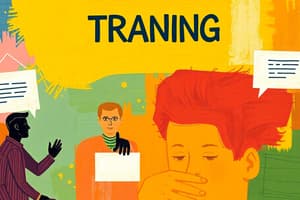Podcast
Questions and Answers
What is program design?
What is program design?
The organization and coordination of a training program.
What is a curriculum?
What is a curriculum?
An organized program of study designed to meet a complex learning objective.
What does RFP stand for?
What does RFP stand for?
Request for Proposal.
What is a support network?
What is a support network?
What is an opportunity to perform?
What is an opportunity to perform?
What are criteria in training?
What are criteria in training?
What is formative evaluation?
What is formative evaluation?
What does ROI stand for?
What does ROI stand for?
What does practicality refer to in training?
What does practicality refer to in training?
What is the Hawthorne effect?
What is the Hawthorne effect?
What is a lecture?
What is a lecture?
What does OJT stand for?
What does OJT stand for?
What is simulation in training?
What is simulation in training?
What is vicarious reinforcement?
What is vicarious reinforcement?
What is experiential learning?
What is experiential learning?
What is blended learning?
What is blended learning?
What is mobile learning?
What is mobile learning?
What is distance learning?
What is distance learning?
What are expert systems?
What are expert systems?
What is performance appraisal?
What is performance appraisal?
What is a mentor?
What is a mentor?
What is a coach in a workplace context?
What is a coach in a workplace context?
What is succession planning?
What is succession planning?
What is onboarding?
What is onboarding?
What is virtual reality in training?
What is virtual reality in training?
Flashcards are hidden until you start studying
Study Notes
Training Program Concepts
- Program Design: Involves organizing and coordinating a training program to ensure its effectiveness.
- Curriculum: A structured program aimed at meeting specific learning objectives, such as preparation for professional roles.
- Request for Proposal (RFP): A document outlining requirements for vendors to fulfill training contracts.
Group Dynamics
- Support Network: A collective of trainees who meet to discuss their progress and experiences applying learned skills at work.
Performance Opportunities
- Opportunity to Perform: Refers to providing trainees with chances to apply newly acquired skills in real job situations.
Evaluation Metrics
- Criteria: Specific measures used by trainers and organizations to assess the effectiveness of training programs.
- Formative Evaluation: An ongoing assessment aimed at improving training during its design and development phase.
Financial Considerations
- Return on Investment (ROI): A financial analysis comparing the benefits of a training program against its costs.
Learning Assessment
- Practicality: The ease of collecting outcome measures to evaluate training effectiveness.
Behavioral Insights
- Hawthorne Effect: Phenomenon where employees improve performance simply due to being observed during evaluations.
Training Methods
- Lecture: A traditional method of training through verbal communication of information by the trainer.
- On-the-Job Training (OJT): Practical training approach involving observation and imitation of experienced workers.
- Simulation: A tool replicating real-world scenarios allowing trainees to make decisions with immediate outcomes.
- Vicarious Reinforcement: Learning that occurs when trainees witness others rewarded for specific behaviors.
Experiential Learning
- Experiential Learning: Combines theory with practical exercises, allowing participants to relate learned concepts to real-life situations.
- Blended Learning: An educational approach combining online resources and in-person instruction.
Modern Learning Techniques
- Mobile Learning: Education delivered via mobile devices, facilitated through informal or structured online platforms.
- Distance Learning: Remote training providing knowledge and skills through diverse locations, using modern communication methods.
Technological Tools
- Expert Systems: Software that applies expert knowledge to resolve specific challenges within training and development.
Performance Management
- Performance Appraisal: The systematic process of assessing an employee's work performance.
- Mentor: A seasoned employee who guides and aids in the development of less experienced colleagues.
- Coach: A peer or supervisor providing motivation, skills development, and constructive feedback.
Talent Management
- Succession Planning: Identifying and preparing high-potential employees for future leadership roles.
- On-boarding: The process designed for acclimating newly hired managers into the organization.
Advanced Training Environments
- Virtual Reality: A tech-driven training approach creating immersive, three-dimensional experiences to simulate real-world situations.
Studying That Suits You
Use AI to generate personalized quizzes and flashcards to suit your learning preferences.




